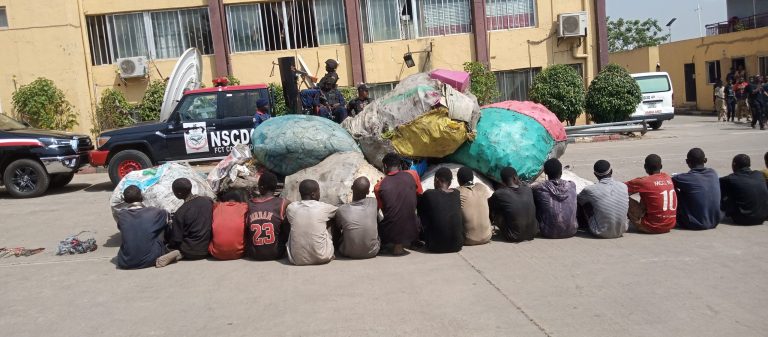Following the ban on scavengers, popularly known as ‘baba nbolas’ the Nigeria Security and Civil Defence Corps (NSCDC), Federal Capital Territory (FCT) Command, has arrested 36 suspects with dangerous weapons.
Addressing newsmen in Abuja, the Commandant, FCT Command, NSCDC, Dr Olusola Odumosu, said that the scavengers who roam the streets of FCT, indiscriminately, perpetrate all forms of criminal activities under the guise of scavenging.
According to him, the move by the FCT Administration was necessitated by the need to nip vandalism of public infrastructure such as manhole covers, streetlights, solar panels, armoured cables, and so on, in the bud.
Items recovered from them include,
four daggers, three jack knives, two chisels, three knives, two pinches and 10 bottles of codeine syrup.
Others are 45 wraps of indian hemps, thrash bags, pieces of iron rods and narcotic drugs.
The scavengers, he explained, go about the nooks and crannies of the city and satellite towns; house-to-house, estate-to-estate, scavenging for plastics, scrap metals and irons.
“But from previous arrests, interrogations and investigations, we have realised that their real business is to vandalise and remove our road infrastructure such as: manhole covers, flood drain covers, streetlights, armoured cables, rail sleepers, iron rods for bridge enforcement and the likes, which would fetch them good money.
“The public also needs to know that some ‘Baba Nbolas’ now disguise to rob innocent commuters and bystanders as they go about with dangerous weapons to attack and disposes them of their personal belongings especially at night. Our record shows that many who dared to challenge them in the past had met their untimely deaths while others are maimed in various parts of the Federal Capital Territory” he said.
Many residents of the FCT and environs, Odumosu noted, have experienced sudden disappearances of many of their household items like generators, cooking pots, stoves, pressing iron, air conditioners, compressors, car batteries, security light panels, iron drain covers and so on.
“Scavengers are major suspects to most of such disappearances and they carry out these activities whenever they notice that there is no one in sight, but not without wielding dangerous weapons in case they are busted by the house owners.
“The most vital is that many of them work as informants for armed robbers, kidnappers, hired assassins, terrorists, bandits and all sorts of criminal gangs. Many families have fallen victims of kidnapping, abduction for ransom, murder, assassination and the likes because they give information about your family, the number of children you have, the types of cars you drive, where you work and by extension, keeping tabs on your movement.
“They (baba nbola) also assess and profile you through the kind of household waste products you dispose which, in most cases, reveal your status and lifestyles.
Unfortunately, and in most cases, many of us perceive these miscreants and criminals as ordinary innocent, poor Nigerians, hustling for their daily bread so they move about unchecked and unquestioned by anyone, some of us even sympathise with them, by extending alms to them, whereas, they are responsible for the various crimes happening around you.
“Owing to these revelation and credible intelligence at our disposal, it is therefore imperative that citizens and residents join hands with the corps and other security agencies to flush out these dangerous elements in the FCT by chasing scavengers away whenever you see them in front of your houses, your streets, neighbourhood or estates.
“The public should note that, although, they appear innocent, armless and vulnerable, most of them are extremely dangerous, their activities are criminal in nature and they constitute threats not only to the safety and security of lives, property and infrastructure in the FCT but to Nigeria’s national security architecture as a whole” he noted.
The commandant used the occasion to advise FCT residents to dispose their refuse properly and stop patronising the Baba Nbolas for the sake of their own safety and that of their family members.
